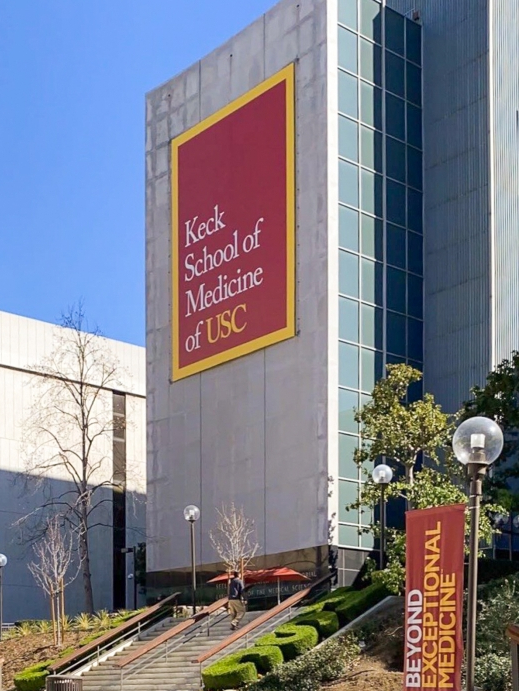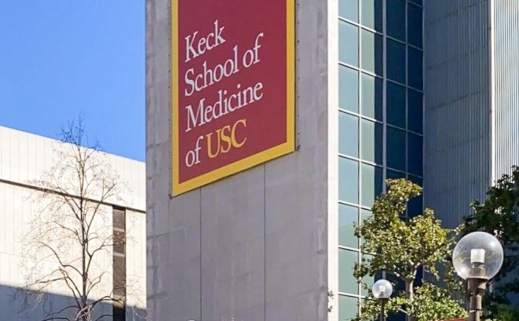USC to mandate coronavirus vaccinations, continues to prepare for on-campus return

(Daily Trojan file photo)
With 48.9% of the total United States population having received at least one vaccination dose and positivity rates decreasing, USC is hoping for a normal return to campus in the fall, Chief Health Officer Dr. Sarah Van Orman said in a student media briefing Friday. However, uncertainty remains around what that full return to campus will look like, including whether or not students will be required to wear masks in communal areas, such as dining halls and classrooms.
“People want to know, am I going to have to wear the mask … in the dining hall, am I going to have to wear the mask in the classroom,” Van Orman said. “We don’t know exactly yet. Probably not, but there still will be some places where people wear masks.”
While the Centers for Disease Control and Prevention recently issued guidance that fully vaccinated people do not need to wear masks except where required by federal, state and local laws, including in places such as public transportation and local businesses, Los Angeles County will require masks indoors, citing guidance from state health officials, until June 15. Following current L.A. County guidelines, USC has not lifted the campus mask mandate for vaccinated people. However, once the County changes its restrictions, USC’s guidelines are likely to follow.
“We always have the option to be more strict than the county and the state. We never have the option to be less strict than the county or the state,” Van Orman said. “Those guidelines are really based on the local conditions. We don’t know for sure, but it’s likely we would follow those. I think mask wearing will be more restricted to certain very high-risk areas.”
Van Orman also said that vaccinations will be required for all students, faculty and staff, barring religious or medical exemptions, once the vaccine receives full approval from the Food and Drug Administration, which will likely occur “as early as the second half of this yearin the late summer or early fall,” according to CNBC. If the vaccines remain at their current emergency use authorization statuses, students will be required to either get vaccinated or decline the vaccine, regardless of medical or religious reasons, Van Orman said.
“You are required to either be vaccinated or decline, so you can’t just do nothing. You have to go in and complete the active declination form,” Van Orman said. “Right now, it does not have to be a religious exemption. If they move to FDA approval, … our current policy is that [those individuals who have declinations] would be asked to either be get vaccinated at that point or then submit a request to receive a formal medical or religious exemption.”
The University also plans to launch communication efforts to encourage students to get vaccinated and create plans to vaccinate international students who have not received vaccinations in their home countries, Van Orman said.
To combat vaccine hesitancy among students, Van Orman said the University looks to have meetings with small groups of hesitant students, faculty and staff to address and discuss concerns about the vaccine. They also plan to create individualized outreach for students who are more hesitant to receive the vaccine.
Van Orman said she hopes that the USC community can achieve a 90% vaccination rate and greatly decrease the odds of community spread.
“It’s really difficult for a virus to spread if nine out of 10 people it bumps into won’t be impacted by it,” she said.
Van Orman also emphasized that some are unable to receive the vaccine because of legitimate medical or religious reasons, making vaccine passports — digital or paper proof that someone has been vaccinated — to acquire entry into certain events and buildings on campus unlikely, even after the vaccines are fully approved by the FDA. However, unvaccinated students will be required to be tested frequently.
“As a university, it’s unlikely we would say you can’t do something unless you’re vaccinated,” Van Orman said. “We want our community to either be fully vaccinated or regularly tested, and if we have a high level of vaccination — 80 to 90% — and those unvaccinated individuals are engaged in regular testing, those two things together really create a very safe environment.”
Even as countries around the world continue to face devastating outbreaks, Van Orman said that USC is “on a cusp of coming back together” as vaccines have proved “stunningly effective and safe.”
“We’re always glad to talk to people, but these vaccines are looking better and better, which is really very exciting, and we continue to see the absolute devastation that’s been happening in parts of the world where we don’t have good vaccine rates, such as India, and it’s really heartbreaking, so it’s really a great chance for us to get back to normal,” Van Orman said.

